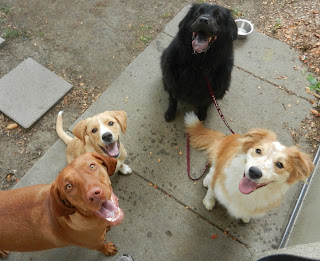Canine Influenza is a relatively new disease caused by a "flu" virus. It causes respiratory infection and only affected dogs. It spreads quickly and may cause serious illness such as pneumonia.
IS IT CONTAGIOUS?
Very. And you don't know which dogs are shedding the virus. Just like human flu, the clinical signs appear after the shedding. First reported in 2003, canine flu quickly reached 30 states by 2009. Then with increased awareness, cases were identified in an additional 8 states.
HOW DOES IT SPREAD?
In 3 ways:
- Through direct contact between dogs (licking, nuzzling)
- Through the air (coughing, sneezing)
- Via contaminated surfaces (such as a shared toy or when a person picks up the virus on their hands, then pets a dog)
About 80% of dogs that show signs of influenza will have mild disease. Signs include:
- Lasting cough
- Low-grade fever
- Nasal discharge
- Lack of energy
- Loss of Appetite
- pneumonia
- high fever
It's hard to diagnose canine influenza. It can be confused with Bordetella (kennel cough) because the signs are very similar. Your veterinarian will treat the clinical sign most likely with antibiotics, but to confirm flu, she would need to collect blood or nasal swab samples.
IS MY DOG AT RISK FOR INFECTION?
Most dogs, regardless of breed or age, are at risk for canine influenza. However, certain venues and activities can raise your dog's risk of canine influenza infection even higher, Review this list of questions to see if any of these places or activities apply to your pet.
DOES YOUR DOG:
- Come from a shelter, rescue center, breeding kennel, or pet store?
- Board at a kennel or go to doggie daycare?
- Attend group training or "dog kindergarten"?
- Visit a groomer or dog parks?
- Enter dog events?
- Travel with you across state lines?
Protection in the form of an effective vaccine is available through your veterinarian. This vaccine has been clinically proven to significantly reduce the severity of influenza and the length of time that a dog is sick. The initial vaccine required 2 doses given 2-4 weeks apart, followed by annual revaccination. If your dog is presently being vaccinated for kennel cough (Bordetella), it is a likely candidate for Canine Influenza (CIV).
At South Des Moines Veterinary Center, we require the Canine Influenza Vaccine for dogs who board and groom with us as well as those dogs who attend doggy daycare here. If you have any questions regarding Canine Influenza, we encourage you to call the vet center 515-285-5523
References: Merck Animal Health
www.doginfluenza.com


Is this easily confused with allergies by chance? My dog has TERRIBLE seasonal allergies and sometimes I wonder if something else may be wrong and it just appears as allergies. She really does just have allergies as I took her to the vet but it's good to know so you can keep an extra watchful eye.
ReplyDeleteGood question! Dogs usually express their allergies through their skin so tend to be very itchy when they have allergies. Canine influenza on the other hand is a respiratory infection.
ReplyDelete